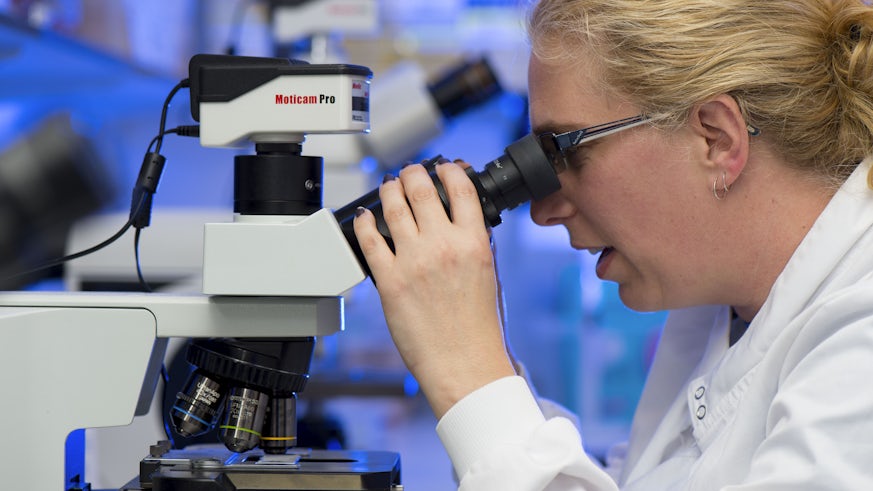ROCS study shows reduced bleeding in tumours treated with radiotherapy
22 February 2021

The study has also shown that combining radiotherapy with stent placement in this vulnerable population doesn't improve swallowing further and the treatment is burdensome and as such it is best avoided for the majority of patients in this context.
Dr Dougal Adamson said, “Palliative radiotherapy did reduce the risk of bleeding and this is the first prospective study that we know of that has shown robust evidence of the impact of radiotherapy on tumour bleeding risk. This should however be reserved for the minority at highest risk of bleeding to minimize burden and optimize benefits.”
The ROCS study patient population were those with advanced oesophageal (gullet) cancer and average survival of 3-5 months, making them a vulnerable group. Significant difficulties with swallowing have an enormous impact on quality of life. In the UK a self-expanding stent placed in the gullet is the quickest way of improving swallowing. However, problems often arise after 10-12 weeks as the tumour grows into or around the stent and these patients end up in hospital and having further interventions just as they approach end of life.
The question for some time has been what else might be combined with stent and maintain swallowing functions for longer without significant additional burden to patients? Patients might be offered palliative chemotherapy which is often poorly tolerated and sometimes radiotherapy but the evidence for this is poor. The ROCS study therefore investigated if a combination of palliative (symptom controlling) radiotherapy with stent placement will improve swallowing as reported by patients, whilst looking carefully also at quality of life and the burden of treatment.
Dr Anthony Byrne said, “Our study shows how important it is to include patients in the palliative phase of their illness - with advanced disease - in clinical trials: they are rarely the focus of large scale studies despite the importance of such results to their care and quality of life. These patients and their families struggle with multiple psycho-social impacts of loss of eating and nutrition as well as the typical symptoms - which stent doesn't address; they have multiple hitherto unseen and therefore unmet needs that require earlier triggering of multi-disciplinary palliation.”
Involving 220 patients from 23 hospitals across the UK, the trial was sponsored by Velindre NHS University Trust and coordinated by the Centre for Trials Research at Cardiff University. It was jointly led by Dr Douglas Adamson from the Ninewells Hospital, Dundee and Dr Anthony Byrne, Consultant in Palliative Medicine at Cardiff and Vale University Health Board and Clinical Director Marie Curie Research Centre. The project was funded by the National Institute for Health Research (NIHR) Health Technology Assessment Programme.
About the NIHR
The National Institute for Health Research (NIHR) is the nation's largest funder of health and care research. The NIHR:
- Funds, supports and delivers high quality research that benefits the NHS, public health and social care
- Engages and involves patients, carers and the public in order to improve the reach, quality and impact of research
- Attracts, trains and supports the best researchers to tackle the complex health and care challenges of the future
- Invests in world-class infrastructure and a skilled delivery workforce to translate discoveries into improved treatments and services
- Partners with other public funders, charities and industry to maximise the value of research to patients and the economy
The NIHR was established in 2006 to improve the health and wealth of the nation through research, and is funded by the Department of Health and Social Care. In addition to its national role, the NIHR supports applied health research for the direct and primary benefit of people in low- and middle-income countries, using UK aid from the UK government.
This work uses data provided by patients and collected by the NHS as part of their care and support and would not have been possible without access to this data. The NIHR recognises and values the role of patient data, securely accessed and stored, both in underpinning and leading to improvements in research and care. www.nihr.ac.uk/patientdata
[1] Contributing Centres:
Ninewells Hospital, NHS Tayside Dundee |
University Hospitals Bristol NHS Foundation Trust Royal Infirmary |
Weston Park, Sheffield Teaching Hospitals NHS Foundation Trust |
University Hospital of Wales, Cardiff and Vale University Health Board |
University Hospital Coventry, Coventry and Warwickshire NHS Trust |
University Hospital Llandough, Cardiff and Vale University Health Board |
Musgrove Park Hospital, Taunton and Somerset NHS Foundation Trust |
Basildon and Thurrock University Hospitals Foundation NHS Trust |
St Mary's Hospital, Imperial College Healthcare |
Nottingham University Hospitals NHS Trust |
Royal Glamorgan Hospital, Cwm Taff Morgannwg University Health Board |
Weston Super Mare Hospital, Weston Area Health Trust |
Worthing Hospital, Western Sussex Hospitals NHS Foundation trust |
Conquest Hospital Hastings, East Sussex Healthcare NHS Trust |
Royal Sussex Hospital Brighton, East Sussex Healthcare NHS Trust |
University Hospital Southampton Foundation Trust |
George Eliot Hospital NHS Trust |
Kent and Canterbury Hospital, East Kent Hospitals NHS Foundation Trust |
King's Mill Hospital, Sherwood Forest Hospitals NHS Foundation Trust |
Doncaster and Bassetlaw Hospitals Hospitals NHS Foundation Trust |
Southend University Hospital Hospitals NHS Foundation Trust |
Royal Gwent Hospital, Aneurin Bevan University Health Board |
James Cook Hospital, South Tees Hospitals NHS Foundation Trust |
[2] Cancer Research UK. Oesophageal Cancer. Accessible: https://www.cancerresearchuk.org/health-professional/cancer-statistics/statistics-by-cancer-type/oesophageal-cancer
Share this story
We welcome approaches to develop and deliver work together.
